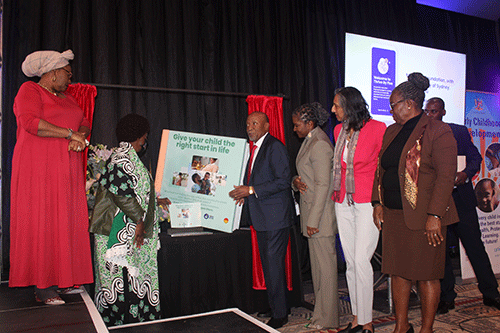A programme offering quality early childcare learning content to parents and caregivers through a variety of digital and non-digital channels, in local languages, was launched with much fanfare last week.
“For too long, the early childhood field has been dominated by western perspectives. We want to elevate parenting practices from across the world so that parents have access to tools that are reflective of their culture and identity,” said Hayley Panetta, Director of Impact at the Minderoo Foundation.
The Thrive by Five Parenting Programme was designed by the Minderoo Foundation with the goal to make early learning childcare systems high-quality and universally accessible by means of the dissemination of content to parents and caregivers around the world through a variety of digital and non-digital channels. It also comes in their own language, and is individually tailored to meet that country’s cultural and social practices.
It was officially launched in Namibia on 24 August 2022.
Panetta highlighted that the purpose of this programme is to combine local knowledge with science to develop tailored content for each community that they work with, a novel approach that they believe has not been attempted before.
The Thrive by Five Parenting Programme was specifically designed and developed for children from birth to five years of age. It includes a range of learning and fun local activities that can help parents, guardians and caregivers connect with children, building healthy habits for healthy homes and more.
Nicola Forrest, co-founder and co-chair of the Minderoo Foundation, said while they support many worthy causes, they believe that investing in early childhood is paramount in that it has the potential to transform society for generations to come.
“Through our Thrive by Five initiative, we have developed and supported many programmes across Australia and internationally in pursuit of our mission to give children the best start in life. Every minute, 250 babies are born across the world – girls and boys who will grow up to be the women and men who run our governments, hospitals, banks, schools, courts and more,” she noted.
“Neuroscience shows that the first five years of a child’s life are vital to cognitive, social and emotional development. Talking, reading, playing and singing with babies and toddlers is so important in shaping their lifelong thinking and emotional patterns. This in turn influences learning, relationships and resilience. Our future prosperity and success depend on positive childhood experiences, which help ensure every single child grows up to be kind, productive and resilient,” added Forrest.
The Minderoo Foundation is an Australian non-governmental organisation founded in 2001.
Noting the Thrive by Five Parenting Programme launch as a significant milestone for integrated early childhood development in Namibia through providing parents access to hybrid parenting programmes, Doreen Sioka, Minister of Gender Equality, Poverty Eradication and Social Welfare said “parents who are uninvolved in their children’s development tend to raise children who lack warmth in their interactions and children with a low self-esteem, children who lack self-control and who are less competent than their peers. Parental involvement is thus a critical element of early care and the education of every child. Meaningful family engagements in children’s early learning supports school readiness and later academic success.”
The minister emphasised the essentiality that lies in every effort that ensures parents laying and nurturing a learning foundation for children to thrive by five, listing that “children need to know that there is an adult for them who will provide them with love, praise, recognition, nutritious food, security, warmth, protection, guidance and the attention they deserve.”
“The government is indeed committed to ensure that all Namibian children receive quality early child development and care,” said Sioka.
She furthermore urged all stakeholders to continue being champions of early childhood development initiatives, and to create mechanisms for responding to the challenges of parents, guardians and caregivers.


